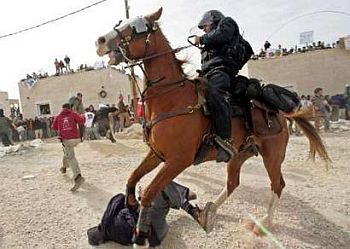

Column One: ‘Strong Leadership for Peace’, Caroline Glick
Excerpts;
“This week, Likud leader Binyamin Netanyahu took a vital step towards reinvigorating Israel’s democratic system. By forcing the Likud’s Central Committee members to transfer their power to select the party’s Knesset candidate slate to the rank and file membership of the party, Netanyahu brought about a change which optimally will make Likud Knesset members directly responsible to more than 100,000 voters rather than to 2,500 party officials.”
“It makes sense that a politician who bases his party’s electoral campaign on the slogan ‘Tough on Hamas’ believes that his chances of winning are increased by enhancing Israeli democracy. Yet empowering voters goes against the grain of the political trends of recent years. The direct link between the strength of a country’s democracy and its ability to effectively wage war against its enemies has been swept under the rug.”
“Sharon’s decision to uproot all Israeli communities in Gaza and northern Samaria and to withdraw Israeli forces from Gaza was made without any debate or discussion. Neither the government nor the military deliberated on the policy before it was adopted. Similarly, no public debate of the policy was conducted after Sharon publicly announced it.”
“Rather than convincing the public to support the expulsion and withdrawal plan by explaining its rationale and merits, Sharon and his political advisers set out to rally the public to their side by demonizing and dehumanizing the plan’s most direct casualties – the Israeli residents of Gaza and northern Samaria specifically, and the religious Zionist public with which most of the residents are generally affiliated. To maintain pubic support for the plan, the government, with the support of the state prosecution, the judiciary and the police, systematically undermined and trampled its religious opponents’ civil rights through openly discriminatory law enforcement policies and judicial rulings.’
“It should be recalled that in the aftermath of the expulsion of all Israeli residents of Gaza and northern Samaria, the public defender’s office issued a report in which it concluded that the government had prejudicially enforced the laws against its political opponents. After being threatened by Justice Minister Tzipi Livni, the state prosecution and a senior judge, Chief Public Defender Inbal Rubinstein, distanced her office from the report’s conclusions.”
“So what we see with the erosion of democratic governments in Europe and Israel, and the decay of liberal values that form the basis of those governments, is that it is not in the waging of war against one’s enemies, but in their appeasement that the roots of political tyranny and intellectual serfdom are found. And so it is that the democratic champions in Likud attempt to rally the people to their side by promising to be ‘Tough on Hamas.’ They rely on the people’s involvement in the policies of their government to advance their political fortunes.”
“In contrast, how does a party that has adopted a policy of surrendering to the country’s enemies show its strength? As Israel’s experience over the past year and a half has shown, they do so by demonizing and persecuting their domestic political opponents who stand in the way of their plans. And so it is that for its campaign slogan, Kadima has chosen, ‘Strong leadership for peace.'”